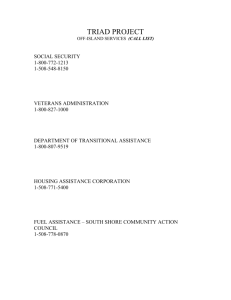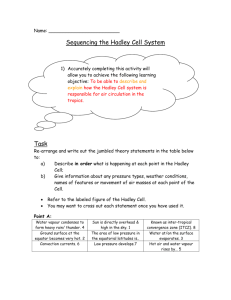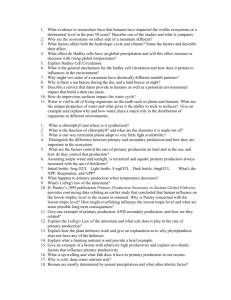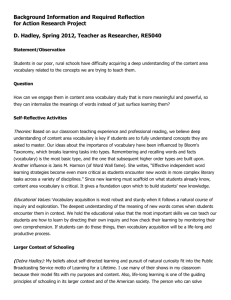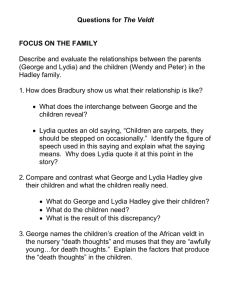First Steps to a Financial Plan Transcript
advertisement
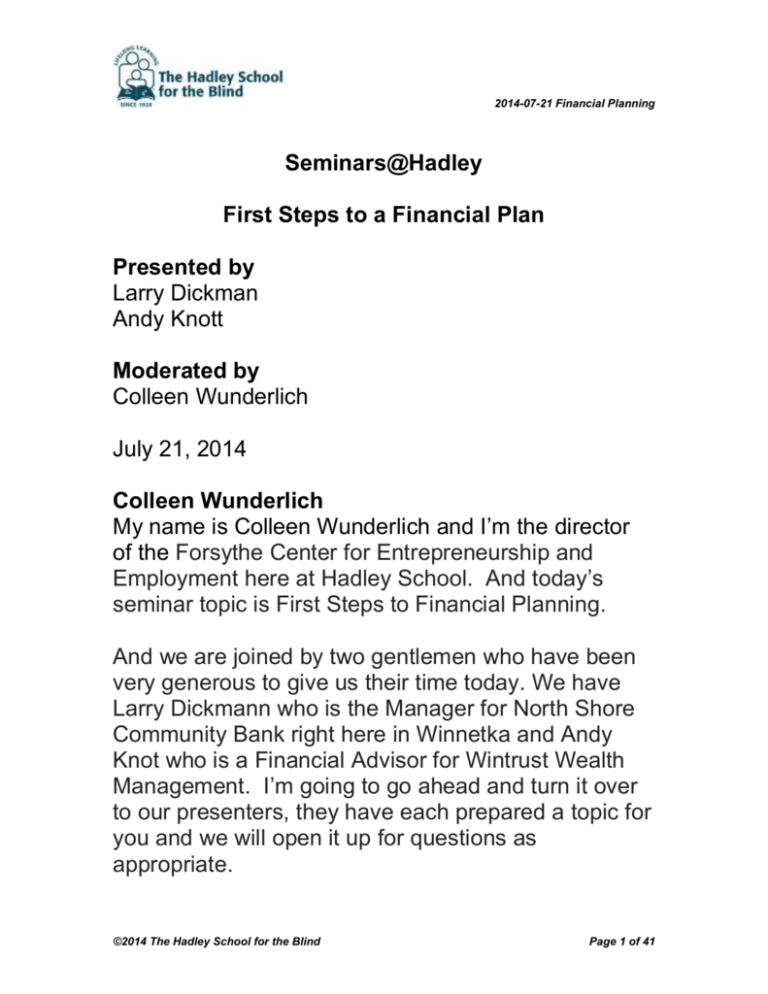
2014-07-21 Financial Planning Seminars@Hadley First Steps to a Financial Plan Presented by Larry Dickman Andy Knott Moderated by Colleen Wunderlich July 21, 2014 Colleen Wunderlich My name is Colleen Wunderlich and I’m the director of the Forsythe Center for Entrepreneurship and Employment here at Hadley School. And today’s seminar topic is First Steps to Financial Planning. And we are joined by two gentlemen who have been very generous to give us their time today. We have Larry Dickmann who is the Manager for North Shore Community Bank right here in Winnetka and Andy Knot who is a Financial Advisor for Wintrust Wealth Management. I’m going to go ahead and turn it over to our presenters, they have each prepared a topic for you and we will open it up for questions as appropriate. ©2014 The Hadley School for the Blind Page 1 of 41 2014-07-21 Financial Planning Larry Dickman Okay. Thanks Colleen. I’m Larry. I appreciate the opportunity of coming here today. First of all, I just wanted to start out and say that Wintrust is a retail bank too, because I am in retail banking. I know that a lot of people hear about bankers in the press and the paper. Sometimes positive sometimes negative, but we’re a retail bank. An investment bank is the one obviously underwrites securities and bonds. In a retail bank, the way they make their money and the way we reach customers is that we accept deposits from customers and then we lend that money back to customers. Also, and obviously we pay you less than we charge you typically at a loan, so there is a spread there were we make our money. Also, we invest with the money you receive in bonds as well; usually when we receive the money from you we invest it in a longer term as opposed to the shorter term that we are paying on you so that we do make a spread there on funds. Also fees I’m sure you have heard of overdraft fees or analyze fees and debit card fees. Fee income is also very important to us. So, that is kind of how we as a bank make fees on our accounts and how we pay for the buildings, pay for the employees and basically service the public. What we offer, again, is the basics for both consumers and for businesses. Checking accounts ©2014 The Hadley School for the Blind Page 2 of 41 2014-07-21 Financial Planning again, are the most basic thing that we offer for both consumers and businesses. Debit cards, again, things that are completely liquid, short term, no penalties for withdrawal, low minimums. We as most banks offer checking accounts that pay interest; usually no minimums, we’ll pay a lower rate of interest. And if typically you have a minimum balance of let’s say, $5,000 or $10,000… So, we have the whole gambit for any type of consumer, any type of person who has as little as a couple hundred dollars in the account to hundreds of thousands of dollars. What separates us a little longer term are what we call tied deposits, which are savings accounts first of all. Savings accounts do have little limits as far as how often you can make withdrawals and how often you can make transfers out of those accounts. Again, typically for ours when it comes to savings accounts they’re used for savings, so usually we will have a higher minimum and we will pay a little bit more interest. To take it out even further we have what a called a CD or a Certificate of Deposit. Certificates of Deposits do pay and have promotions but everything else equal will pay you a higher rate of interest, but again you would give us that money and lack in that money for a specific period of time. Typically anywhere from three, six, nine, twelve months out to about five years and again those are ©2014 The Hadley School for the Blind Page 3 of 41 2014-07-21 Financial Planning locked in, and if you do break those or withdraw those you can, but then there would be a penalty that would be assigned to you. Those are the basic accounts that we offer. Also, something very important to us, we offer IRA accounts. So, if you want a safer retirement outside of the savings account, we do offer IRA’s. Those have the typical cap on what you can invest each year that accumulate. Tax deferred or tax free depending on what type of IRA. Also, we started doing health savings accounts now in this current environment where insurance companies having higher deductibles with the new health care system in place. Health savings accounts are very popular. It works like a checking account were you can have a debit card. Your cap to what you can contribute each year but you would use those only for medical expenses. That has been a big thing for use actually in the last couple of years or so. Right now in this low interest rate environments, anything over 1% on a time deposit or anything over that is really very rare to see. Then outside on the investment and deposit side we also offer loans. And the loans are anywhere from very short term to again a very long term. We offer credit cards. I’m sure most people are aware but the typical credit card is none secured. Meaning what we do is we pull your credit, see what outstanding debts ©2014 The Hadley School for the Blind Page 4 of 41 2014-07-21 Financial Planning you have, look at your income level, and also look at what debts you have outside your FICO score to receive a credit card. We also have secured credit cards for people typically who do not have credit and want to build credit. A secured credit card is secured by a deposit that you make. So let’s say, a minimum for us is $300, you would have to give us a deposit of $300 and you would have a credit line off of that $300 to use. It would look like a non-secure credit card that you could use as long, as you make those payments on time everything works fine. Typically after 12 months you would be able to make the transition to a nonsecured card, meaning you wouldn’t have the hold with us on the funds on deposit to use a credit card. Also just again emphasizing the full gambit we also have safe deposit boxes. Again a lot of people use banks for their valuables; most places just need a checking account. They are very inexpensive. But it would keep your stock certificates, jewelry, again just for a very low annual fee. Typically a small box will be only $35 and those are very popular and a great thing that we provide to the public. Also if you go out longer for loans we offer home mortgage loans and also home equity lines of credit. Again in this low interest rate environment with all the ©2014 The Hadley School for the Blind Page 5 of 41 2014-07-21 Financial Planning refinancing going on we’ve been busy. We can do anywhere from five year adjustable rate, 10 year adjustable rate out to a 15 year fixed rate or a 30 year fixed. Again a home mortgage is amortized; usually I would say a principal on interest. Then we do home equity lines of credit which are a loan secured by the equity value in your home, so we also offer those. Same thing for businesses; we do business loans based on the credit and the under writing is based on the receivables, based on what you have in the bank, outstanding debt. We do that and also business lines of credit. We also do on both of those which are very popular and both of those have overdraft protection. Meaning if you have a checking account and you tend to overdraw it, we would run your credit and maybe give you a small line of credit of let’s say, $500 or $1000 where if you did overdraw we would pull that. Instead of charging you a fee, basically we would treat that as a loan you would have to pay off. The overdraft lines are another option, something for consumers and businesses. Most banks we do our own underwriting. We are a local bank, so we do all of our own underwriting ourselves. Larger bank would typically have a staff that could be in Chicago or throughout New York or ©2014 The Hadley School for the Blind Page 6 of 41 2014-07-21 Financial Planning Texas or Florida, but we would do all of our underwriting here. Meaning you would have to fill out all the paper work, we would have to ask for your tax returns, for investments, and depending on how much you ask it could be a little more complicated. Again, we would make the decision at a branch level. And then another popular thing that we get asked all the time as far as loans is, “What determines the rate that we charge?” Right now it hasn’t changed. The rate of 3.25% is the prime rate which is the best rate that we will charge businesses to borrow or even on the consumer side. What affects it? Primarily it is your FICO score. That would be, there’s three organizations: Experian, Equifax and Transunion. They keep track of, again, how often you’ve had credit? How many credit cards you have, how many home equity lines you have, your mortgage, how often do you make your payments, if you have missed any payments, if you have had a bankruptcy in the past, if you a balance outstanding for a loan for a long period of time, did you keep refinancing? They do all that work, so we do rely on them as well. That is what basically determines how much you’re charged on a loan and obviously the least amount of ©2014 The Hadley School for the Blind Page 7 of 41 2014-07-21 Financial Planning debt you have and the higher the FICO score it would get credit for a lot lower rate. Also what sets us apart from the financial services area, is that all of our bank products are FDIC insured up to $250,000 per individual. We pay the FDIC, the Federal Deposit Insurance Corporation, which is an outside government agency. We pay them an insurance fee each year. The bank in case, again it wouldn’t happen, but in case there is an issue with a bank in being able to meet their demands of their depositors, that you would be insured $250 per individual, for a joint account, $500,000. Everything we have is very low risk and the return is probably appropriate for the amount of risk that you want to take. We’re different from a brokerage or financial service products that are not FDIC insured, and Andy will probably talk about that in a little bit. Also in banking, when I was putting this together, how has banking evolved? I would say the most important thing that has happened to us, especially in the last five to ten years, is with technology changing everywhere, it’s really affected the retail banking side as well. So at Wintrust right now there are a great deal more options on how they want to bank. In the old days or even for me 30 years ago; when you had a savings account you had to go to the ©2014 The Hadley School for the Blind Page 8 of 41 2014-07-21 Financial Planning branch, you would have a book. The teller would stamp the book and you basically had to get to that bank between 9 to 5. If you didn’t, we didn’t have any ATM’s back then, you would have to go on your lunch hour. Now with technology we have online banking, we have phone and mobile app banking, meaning, you can call in and do transfers online between your accounts. Online banking you can pay for those. You can do transfers online as well, you can contact customer service. We even have a mobile app now where you can download an app off of the app store for our bank and for other banks. You can take pictures of checks, front and bank, and submit those, so you can basically do a deposit wherever you are. If you’re traveling and get checks out of state you can take pictures of those and submit those and they are handled just if you were to make a deposit in our branch. General trends are that people nowadays are probably using a lot less cash than they have in the past just because of debit cards. Mobile banking, you don’t have to carry around as much cash, which tends to make it a lot safer. Again, with direct deposit, the money goes in and it is liquid right away. But I want to add, even though it seems that technology is pushing customers out of the bank, really nothing takes place of a personal banker in any level of banking that actually knows your customer and that can have a ©2014 The Hadley School for the Blind Page 9 of 41 2014-07-21 Financial Planning personal relationship with your banker. I just know that in our bank we have had customers who have started out as junior savers, meaning they have savings accounts that are custodial with their parents and then go away to college. Then they get a college checking account. And when they get out of college they get a personal checking account. So we’ve come to know our customers very well. Nothing can ever really replace that in the sense that if you have a question or have a problem with your account, if you are traveling, to have that relationship with that personal banker is still very important. I don’t want to say that because of technology you don’t have to have that, but technology makes things easier in conjunction with have a great relationship with a personal banker. Also, having said that, there are some challenges that we see because of technology, that I just wanted to go over real quick as well. Obviously when I put this together a couple hard topics are debit card fraud and just fraud in general. Because now everybody uses debit cards, there is a sense that they’re not safe. I am pretty sure everybody has heard about what has happened to Target and Michaels and Neiman Marcus where people have got ahold of credit card information. That does happen, but we and other ©2014 The Hadley School for the Blind Page 10 of 41 2014-07-21 Financial Planning banks spend millions of dollars protecting our customer information. Whenever an account is compromised or we get something back from MasterCard that this card has been compromised, we’re on top of it. The customers are on top of it and what we tell them to do is to monitor their accounts. If they see anything where they think it is an unauthorized transaction, we can put through a report and make sure that that transaction is valid. If it is not valid, we can basically make sure that we get the funds back that were misappropriated. I just want to say that that is one thing that banks and operations department, especially in the last two to three years have been spending a lot of time on or safeguarding customer’s information. The privacy policies as well, anytime in banking we open an account or a bank opens an account, we have to know the customer, we get valid ID’s, check the identity, whenever there is a withdrawal on the account all the signers on the account. We have access to all credit card and debit card information. Again if there is a problem we are very hands on, as most banks, very hands on as far as making sure that your privacy is protected so you don’t have problems with fraud. ©2014 The Hadley School for the Blind Page 11 of 41 2014-07-21 Financial Planning Other issues I would say with banks, lately there has been a lot of talk in the news about large banks paying fines, large banks paying settlements on mortgages. Really banks just really follow the law and follow court orders. We don’t make laws. Overall the regulations are probably getting tighter as far as what we do, as far as giving mortgages. In the past, maybe some mortgages shouldn’t have been given out. For some banks they caused a lot of trouble; that’s why the underwriting is so important. That is why there is a due diligence on our side for you to make sure that you are getting appropriate products is very important. Again, because of this broader banking environment in the last seven or eight years we have been very successful and other banks have been successful in providing the right product to the customer. That is more on the retail side where I am coming from. On the other side as a retail bank we also have a financial advisor in our branch. A lot of times a lot of people come in and say, “Well, I think I’m all set on the retail side. I got my checking accounts. Do you have anybody who can give me a fund or a stock or a bond outside of what you do?” In that case we do. We work with a bunch of banks on the investment side, working with a financial planner ©2014 The Hadley School for the Blind Page 12 of 41 2014-07-21 Financial Planning or financial advisor. Again, it’s very separate. We got to make sure they know that it’s not FDIC insured; we’re very upfront with that. We do make those referrals but we do rely on a financial advisors to kind of provide a one stop shop for everyone’s financial needs. Again, why we bring in a financial advisor is for things outside of the FDIC insurance, which is retirement planning and financial planning as far as estate planning, that is really outside of the realm of most of our products on the retail side. So are there any questions? I know I went through a lot of stuff, but are there any questions on what I’ve said so far? Colleen Wunderlich Yes, I have some. So if you have some additional cash, okay, the interest rates are low everywhere, how do I decide: Do I want a money market account? Do I want a savings account? Do I want an interest bearing checking account? I mean how do I make that decision? Larry Dickmann Well with us, we usually look at how much risk you are willing to take and how liquid you want this. So I would say the first thing is, do you want it FDIC ©2014 The Hadley School for the Blind Page 13 of 41 2014-07-21 Financial Planning insured? And do you want to be able to have access to those funds? So the big thing that you have to look at is the liquidity, how quickly. So say, Larry, we have a one year CD paying 1.5% or 1.25% A savings account that pays 0.1% That savings account you can have access to at any time. The CD, if you break it you’re going to lose all that interest. So the first thing that we do is sit down with somebody. Again these are the options: How much do you need access to those funds? Do you want it insured by the FDIC? And do you need availability? If you are comfortable with risk, if you are comfortable with something out of the FDIC, we would refer you over to Andy or a Financial Advisor. Our bankers would give you all of our options as far as what it would pay, and then if there is something that you would like to know further we would direct you to our Financial Advisor as well. Colleen Wunderlich So if I wanted…you mentioned that with a savings account a person is limited to how often they can withdraw from the account. So if I want a savings account then I need to that that into consideration. If I wanted a money market account then that would ©2014 The Hadley School for the Blind Page 14 of 41 2014-07-21 Financial Planning mean that I probably have to put a minimum in that account, right? And then how much money I have to put away, wouldn’t it? Larry Dickman Right, that’s right. So a money market would have a higher amount to keep on hand. Typically for us most start off at $1000 some, $2,500, some $5,000. So if the ones you were in were at a higher rate you would have a higher minimum. If you fell below that minimum you would probably get hit with a $5 to $10 fee. In this interest rate environment, depending on how much you have, a $10 fee would probably take care of all of the interest. You would have to determine how often you would want access to it. So, like a savings account you’re limited to how much you can transfer in and out. You can come to the branch anytime and make a withdrawal, but if you do that you really are just defeating the purpose of having an account there earning interest. Because if you are constantly… we have a on a minimum savings account of $200, occasionally I will see people, I want to save, they dig into it, got below $200, get hit with a $5 fee. Their interest for the month would be $2 and then they’re like, “Why did I get hit with a $5 fee?” Well you’re under $200. Again when it’s a savings account you really have to make sure…Again it’s a ©2014 The Hadley School for the Blind Page 15 of 41 2014-07-21 Financial Planning savings account and you are not going to constantly dig into that and drop the minimum down. Otherwise you really should look at your risk and your time frame if it is appropriate for you. If you are willing to take more risk outside of the FDIC insured, you really should talk to a financial advisor who can guide you as to what other options there are that would pay a higher rate and what the risks would be. Colleen Wunderlich So in an interest bearing checking account, if I didn’t have enough money to keep a savings account, I could just have an interest bearing checking account. When I get paid, I get maybe electronic deposit. I know at least what’s in there is earning interest at least until I have to use it. I would maybe do that because I just don’t have enough to put in a savings account or I need access to that money. So that would probably be the best option then. Larry Dickman Right. That account now pays usually anywhere from 0.01% to maybe at a high end 0.10% Colleen Wunderlich Unbelievable. ©2014 The Hadley School for the Blind Page 16 of 41 2014-07-21 Financial Planning Larry Dickman Well the good news is that you are earning interest. The bad news is that you are probably not earning that much with 0.01%. Right especially if you have an average balance under a couple hundred dollars, you’re probably earning… lower accounts... There’s nothing wrong with it, but you are probably earning maybe 20 cents a month or so. Colleen Wunderlich Then why bother. You mentioned, I’m going to switch topics, talking about the credit cards. Larry Dickman Sure. Colleen Wunderlich I think you referred to them as secured and unsecured credit cards. Are the secured credit cards then thought of as debit cards? Then why would I want a secured credit card versus…? Larry Dickman No, that is actually a credit card. So it wouldn’t be a debit card, you would have to actually…you wouldn’t type in a pin on that. You would use it just like a regular credit card; it’s just that your limit is set to how much you can spend. ©2014 The Hadley School for the Blind Page 17 of 41 2014-07-21 Financial Planning So let’s say you spent $300. You would have to deposit $300 in a special set up account with our credit card provider and that would be your limit. So when you use it, you would have to charge it, you would get monthly statements and then you would have to pay that. It’s not like a debit card where you would swipe it and the money would be taken out of your account immediately, just as long as the money is in your account the transaction would go through. It’s a secured credit card. It really is not a debit card even though on a debit card they say, “Debit or Credit.” I will point this out; you can use it by entering a pin or use the credit just to sign it. But again, that is outside of the realm of a secured or non-secured credit card. So debit card is different in the sense that it is going to take money directly out of your account. Colleen Wunderlich Okay so why would I want a secured credit card? Would it be if I had a kid going to college and I had to keep their funding? Larry Dickman Mostly we see people who, A, have bad or poor credit and can’t get a regular non secured credit card. Or some kids out of school that have no credit and want to build credit, is why you would have a secured credit card. So primarily if you have bad credit and no one ©2014 The Hadley School for the Blind Page 18 of 41 2014-07-21 Financial Planning will offer you, you applied for a non-secure card, you can get a secured card, meaning you have to have deposited money then you can use it. Hopefully you make those payments and then eventually get a nonsecured card. Colleen Wunderlich Okay, I didn’t know that. I never thought of it as a way of building credit. I mean I’m asking these questions primarily for our audience. But I just learned something. So now let’s talk about loans. You mention about home equity loans that is borrowing against the home equity against you home. That has gotten a lot of people in trouble. Who would you consider a good candidate for a home equity loan? In other words, who is someone who should take one out versus someone who shouldn’t take one out? Larry Dickman Well it depends really on how much equity you have on your home. So usually on ours, at best rate, you can’t take out more than 80% equity in your home. Good candidates would be people who have a good credit history, good credit score, have a lot of equity in their home. ©2014 The Hadley School for the Blind Page 19 of 41 2014-07-21 Financial Planning So it wouldn’t be for someone who says they have a mortgage of $350,000, their house was appraised at $375,000 and they want to take out a home equity max and take that money out and buy a boat, or travel, or basically max out to the hilt the home equity loan. That is why underwriting is so important. Typically for us, we very rarely go over 80% of loan to value. If your house is appraised… and again appraisals are a big part of this on the home equity side. So if your house is appraised at $1 million, we really don’t like to see you go over, your mortgage and home equity line, of over $800,000. People got caught back in ‘06, ‘07, ‘08 in lots of trouble; I used to work at another financial institution as well. They had home equity lines that would be at 110% value of your home. So people were taking out loans and they were basically taking out more than the value of their house. Then when the housing market went south, they got even more in trouble. Again, home equity if used properly, is a very good thing. The money that you have when using a home equity loan are usually for larger purchases like a home remodeling or a car purchase, consolidating debt were you would be charged less than you would be on a credit card, but again you have to have the responsibility. ©2014 The Hadley School for the Blind Page 20 of 41 2014-07-21 Financial Planning The ideal candidate has good credit, a lot of equity, and a track record of being responsible. That doesn’t mean…and again in this banking environment it is a little tougher right now to get a home equity line and home equity lines are now smaller than they use to be. Colleen Wunderlich Do we have any questions from the audience? Speaker We do, we have a couple questions. Miranda would like to know she says, “If I needed to rebuild my credit and chose to use a secure credit card to do so, could I continue to use that credit card as a secure card instead of transferring it to a non-secure credit card?” Larry Dickman Absolutely! You can use that secure card as long as you want. I would say most people use the secured card to eventually be able to transfer it to an unsecured card just because you don’t have to keep the funds on deposit with the institution. But you can always keep it if you are worried about spending over you means or not having that option to keep that. That’s a little bit more of a conservative option. Absolutely you can always keep it as a secured card. ©2014 The Hadley School for the Blind Page 21 of 41 2014-07-21 Financial Planning Speaker We got another question here but I actually think it is probably more of an Andy question. And looking at the clock it might be a good time for us to sort of shift gears and bring Andy on board. Everybody happy with that - to switch gears? Colleen Wunderlich Yes. Andy Knott Sure. Thanks Larry. Larry and I work in the same building. We see each other every day, but we joke that Larry sits in the front of the bank, and that is “FDIC Land.” Everything is protected everything is guaranteed. And I sit in the back and I am not in “FDIC Land”. I deal with the stock market and the bond market. And I see Karen’s question and I am going to try to get to it directly, but I want to set this up and give a little background on where we are today versus three or four years ago as we come out of this financial recession. And why I am as busy as a one arm paper hanger. This is some financial planning information from the National Association of Personal Financial Advisors, ©2014 The Hadley School for the Blind Page 22 of 41 2014-07-21 Financial Planning NAPFA.org, and that’s a good place to go to find a Financial Advisor and I will come back to it. This is the environment we are in: today 56% of adults lack a budget. 40% of US adults are saving less today than they did in 2011. 39% of US adults have non-retirement savings. That is four out of every teen people. Three out of ten people that are mortgage borrowers are underwater. Meaning they owe more than their house is worth. If they sold their house they would have to bring cash to close it. 41% of baby boomers do not have a will and about a fifth of all Americans, 23% are not at all confident of having a comfortable retirement. So I joke sometimes, but there’s a ring of truth to it that 20% of what I do every day involves some skills and the credentials I have, and 80% of what I do every day is working on behaviors, thinking about psychological reactions - the emotion around money and trying to help people through whatever issues they have. I am a Financial Advisor. I’m a certified Financial Planner, so I do planning as well. I’m a Portfolio Manager, I manage assets on a discretionary basis, I wear all those hats, and I suppose that there is no denying that I am also a stock broker. ©2014 The Hadley School for the Blind Page 23 of 41 2014-07-21 Financial Planning All these things have different implications. But let me just talk a little bit about the background of financial planning. If a person were to go put themselves in the hands of a Financial Planner they might be wondering, “Well what is the process?” It’s pretty simple. It is basically six things, first I am going to meet with you, or any Financial Planner is going to meet with you and establish the relationship. Do we want to work together? In the initial interview I am going to ask a potential client, “What are your goals? What are your dreams?” This is like going to the doctor actually. It becomes quite intimate. What is your financial history? What are your fears? What are your expectations? Now not everybody cooperates like that. Then I have to make a judgment as to whether I have enough information that I can actually do the job that they may want me to do. And at the end of that very first meeting, each party should have some idea whether it makes sense to work together or not. That meeting doesn’t cost anybody anything but time. If the prospective client says, “I’d like to become a client,” and we engage in financial planning or they ©2014 The Hadley School for the Blind Page 24 of 41 2014-07-21 Financial Planning want to bring assets to me at Wintrust. Then I would begin to gather data. I am going to ask you for your financial statements, your mortgage statements, and credit cards. I want to understand the entire budget. I am going to analyze all that, that is basically the third part of the process. I am then going to develop, recommend, and present a plan a recommendation. This is not a one way conversation. This is a back and forth. I give my best judgment as to what we ought to do but I tell the client, “It is your money and we will do it your way if I can go along with that, or it may be that we need to reconsider whether we work together.” And the reason I say that is if I am talking to a retiree who has no W2 income, has no job and is living off savings, and they are asking me to put the majority of their assets in a stock like Google. I don’t think that is a good idea. So we may argue, but also it is the clients’ money and the client will do what they want. I just may not be the person that helps them. If we agree on what the recommendation should be then I implement it; that’s the fifth step. And then of course I do ongoing monitoring. Speaker Now Karen has a question, “How does a person go about finding a good Financial Advisor and how much do they generally charge?” ©2014 The Hadley School for the Blind Page 25 of 41 2014-07-21 Financial Planning Andy Knott Alright, I will give you a couple of steps as to how you might find a Financial Advisor. You can go on the internet. You can look in the yellow pages. Probably just as useful would be to first have some discussions with your loved ones; your spouse, other folks in your family. Tell them generally what it is you are looking for. Get some feedback from anybody you may know that may have some experience. One of the things I am going to ask, and I suspect any other good advisor is going to ask, “Are you looking for someone to help you plan for a milestone like college? Or buying a house?” That will help narrow down the skills set that you are actually looking for. You can also go to as I said, “napfa.org.” N as in Nelly. A. P as in Paul. F as in Frank. A. Dot org. And look for an advisor that is close to you, those are well qualified people. I am a certified Financial Planner, that website is C-FP dot net. And you can also look and see if there certified Financial Planner in your neighborhood. I always believed…we have clients all over the country, but most of my clients are in the Chicago area. And it makes sense because a lot of what we do is face to face. We are doing more electronically and digitally, but face to face meetings are still an important part of ©2014 The Hadley School for the Blind Page 26 of 41 2014-07-21 Financial Planning our practice and I go to them, they come to me, and it is so much more convenient if people are close by. You can go to Garret Planning. G- A- double R-E-T as in Tom -planning dot com. One caveat for anybody looking for an advisor, “It is very hard for one advisor to be all things to all people.” I will try to come back to that if as we go I can think of an example that may clarify that. If you are looking for an advisor, do your homework before you make an appointment. Check the company website. My company is Wintrust Wealth. Larry didn’t tell you but the history of Wintrust is that it owns 15 bank charters with North Shore Community Bank being one of them where Larry is employed. It owns a broker dealer called Wayne Hummer. I am licensed at Wayne Hummer and it owns an advisory firm; people that give advice for a fee and that is called Great Lakes Advisors Firm. So check out the website and read. Come to understand that feel comfortable with what it is that you are reading. It is almost like looking at colleges. That you feel comfortable at this college versus some other college, that everybody tells you, you ought to go, but you don’t feel comfortable. This is personal taste. You look at their service offerings, you look at their bios. Also, at sec.gov, that is S-E-C dot gov. There is a whole website run by the Securities ©2014 The Hadley School for the Blind Page 27 of 41 2014-07-21 Financial Planning Exchange Commission, and each one of us who is an advisor as opposed to a stock broker. The advisor is a fiduciary on behalf of his clients and they are regulated by the SEC. Everyone that is an advisor must fill out on an annual basis the form ADV. Apple-David-Victory. That stands for short: board advisor. On that ADV form I have to give my background. I have to answer questions about my business practices, my fees, any conflicts of interest, my disciplinary history. They are all available on the SEC’s website. “How do you get paid as an advisor?” Well first let me finish. So then meet the advisor, make a few appointments, and discuss face to face your goals. Ask questions. Get comfortable. Evaluate his or her experience and knowledge. This is a personal relationship. So make it personal. Communication if you retain this advisor is the key. These are typically long term relationships. You should stay in touch. They should stay in touch. I will tell you that some folks only want to know about performance. I am held to the performance of course, markets are up 30% this year and the client only made 10%. I might have some explaining to do. It could easily be explained, but nonetheless I have to be conscious of that. ©2014 The Hadley School for the Blind Page 28 of 41 2014-07-21 Financial Planning Everybody is the same. They like the highest amount of returns for the lowest amount of risk; and that is fair. That is just human nature. But I also tell my clients to look at the big picture. Have we been attentive to your requests? Are we addressing your goals? Have we answered your questions? And most importantly are we moving down the right path? If you are going to retire in 10 years, are we off to the right start? Three years into this are we down the right path or do we need to make a change? And often when we have semiannual meetings, quarterly meetings whatever schedule the client would like to be on, I am again asking those questions of the client when we sit down. Before we even talk about the money, I want to know how the things are going in your life. How is your health? Has anything changed? Do you still feel secure in your job? Do you still want to retire in seven more years, etc.? Just like going to the doctor. I hope that I have answered the question for Karen. One of the things I do as will is that twice a month I teach ethics to Illinois insurance agents and today I learned something. I already taught a class this ©2014 The Hadley School for the Blind Page 29 of 41 2014-07-21 Financial Planning morning. I was under the impression that I got several titles, fancy titles. I am a lawyer so I have a JD, I have a MBA from Duke, I have a CFP. I have all sorts of curious licenses. I thought that there were about 140 designations. Today one of my students told me, “No Andy, I just read that there are more than 3,000 designations which you can have within the financial industry which roughly covers what I do and what Mary does.” That’s too much. That is ridiculous. Especially when you think about, where is the money in America right now? Well, bless his heart, it’s not with my 24 year old. It is probably with his grandfather. It’s with seniors. It’s with the elderly the baby boomer generation; the greatest generation. Whatever you want to call it and they are getting up in age and where there is money, it is going to attract flies. It is going to attract a lot of nefarious characters who want to flash all sorts of credentials. And it is a growing problem in the financial services and gives everybody a black eye. So again, buyers beware. Caveat to the listener. You really can’t ask too many questions. It is your money you need to feel comfortable. A couple of other do’s and don’ts: Beware of being sold the house product. By that I mean that typically ©2014 The Hadley School for the Blind Page 30 of 41 2014-07-21 Financial Planning for the advisor selling something manufactured by his own employer is going to compensate him higher than if you go out on the street. Beware of the glorified salesman versus the true Investment Advisor who must act in your best interest at all times. The first rule is we must know our customers. By doing that we remain compliant, the first is that you haven’t done anything wrong. That you know your customer and what you did what your customer’s money was suitable. Too often is that you sold them the product instead of you giving them the service that he or she requested. Suitability does not require disclosure, conflicts, or the; who? What? And how? Of compensation, I will address compensation. A stock broker gets paid a commission to sell a mutual fund, buy a stock for clients and sell the stock. Those are transactions, 95% of our business at Wintrust is based on annual fees from the client. I manage assets and I typically am paid between 21 and 21 ¼ quarter percent of the assets under management on an annual basis. In exchange for having that relationship and being paid that way, these are no longer transactions. These are issues about doing the right thing for the client. Put his interest before mind and there are no commissions involved, it’s simply a percentage of ©2014 The Hadley School for the Blind Page 31 of 41 2014-07-21 Financial Planning assets under management. So I hope I answered that question. I am happy to talk more about the senior market but, I will take a break and take a breath and see if anybody has any questions. Speaker As a matter of fact Miley has a question, “First of all I want to say thank you, Karen said you answered her question completely.” Miley says, “I’m wondering if I forfeited any social security income when I opted to start SSEI?” She says, “ I have a an IRA and funds transferred form a 401k; seeking a financial advisor who cannot just only advise me about my investments but also other income like social security and how to maximize that stream of income.” Andy Knott That is a very complex question, but it’s a very pertinent question. It is coming up more and more because as the statistics I read out in the beginning bear out, the social security administration is under. That money to each and all of us that have a right to it after the age of 62 is becoming a more and more important part of retiring. There are literally more than 400 different combinations on how you can take money from the social security administration; between survivor benefits, filing and suspending, between two spouses that work, disability, and others. ©2014 The Hadley School for the Blind Page 32 of 41 2014-07-21 Financial Planning I can’t answer that specific question, but a good financial advisor should be able to sit with you, extract the facts and then go do the research. There are private providers that have software packages that you can put in assumptions like Miley may have and come back with some answers based on assumptions. Which should be in the wheel house of any good financial advisor and don’t forget, the social security administration in itself should be the first stop before you ask a financial advisor to get involved. Speaker We got another question here from Darla and I think this is more of a Larry question. Darla wants to know, “I’m wondering about braille debit cards?” She lives in Tulsa, Oklahoma and says, “I am not able to locate a bank around here that has what I would like.” Larry Dickman I know we have braille ATM’s, but as far as a debit cards, I believe we can request those for both Visa and MasterCard. Again it depends I believe on the financial institution but I believe they are available. What you should do is that when you go to your financial institution and ask if they use Visa or MasterCard and if they would be able to get the braille on the debit card. ©2014 The Hadley School for the Blind Page 33 of 41 2014-07-21 Financial Planning Speaker Great, Charles has a question. He says, “I have an advisor but she keeps charging higher fees. I have known her for years and have a trusting relationship, but is 2.75% annual fee for managing my long term savings more than it is worth?” Andy Knott I would say that without knowing him/her personally that is a quite precious fee. I would think that a more professional fee is somewhere in the neighborhood as I said from; 1.5% down to 1%. I have accounts that are over 2 or 3 million dollars and the fees are less than 1%. That is a high fee but that is actually not unusual and certainly not necessary. Speaker I am going to release the microphone here and see if anyone else in the audience has a question for our two presenters. So I’m going to turn the microphone loose. If you have a question, go ahead and jump right in. Female Hi, this is more of a Larry question. We are having some trouble with our house and we might end up in foreclosure. The bank is finally willing to work with us and they are saying that we can get a 40 year ©2014 The Hadley School for the Blind Page 34 of 41 2014-07-21 Financial Planning mortgage to refinance. I’m wondering if that is crazy or if it’s good? If you can address that… Larry Dickman I have heard of situations like that, the mortgage situation is a separate department in my branch, but I have heard that as far as being foreclosed if you qualify. In a nutshell make sure that the monthly payment will be at a low level, that if you are going through financial difficulties that it would be lower and spread out over a longer period of time. That maybe in 10 to 13 years you would change it into a 20 year rate. So I have heard that, but again I don’t know exactly how you qualify. Was this through a large bank or was it a government agency that got involved with the 40 year? Do you know what type of loan? Female Yes, actually I do. We are working with CitiMortgage and it is a Freddie Mac mortgage and there’s two different choices that they are giving us. They’re giving a 30 year choice and a 40 year choice. There is a $70 difference between the choices and right at this point until I can actually get a job, we are maybe thinking about doing the 40 year choice and then in a few years change it out or sell the house. Depends if the winter is as bad as it was this year, we might who knows. ©2014 The Hadley School for the Blind Page 35 of 41 2014-07-21 Financial Planning Larry Dickman Well what I would do, I would look at your situation; one thing is banks don’t really like to take possession of homes. That is why they have so many options now even since the great recession of ‘08 and ‘09. Having different programs for A, protected or B, giving you the option of going out 40 years. If you go out 40 years what is the option then if you start working again? If you start working again, if you can get rid of the 40 year and get a more conventional loan, talk about the other options. I would say take one of the options since you obviously wouldn’t want to go through a foreclosure but just see, if you do go into a 40 year, what are the options of getting out of it and getting a more standard loan at future point in it and if there are any fees associated with that. Speaker Ashely’s got a great question here, kind of a toss-up question or maybe you both want to address it. She says, “I’ve been going to undergraduate school and I want to save for grad school while working. Is there a type of account I can put money in tax free that would draw interest?” Andy Knott It is a toss-up as to whether that is legal or not. My gut tells me that it is probably not, because in order to save and not get a deduction or saving which would ©2014 The Hadley School for the Blind Page 36 of 41 2014-07-21 Financial Planning be tax free you have to have income. Unless Ashley has a job, as well as going to undergraduate school. She won’t be able to create a qualifying account that will be tax deferred. The other thing to think about is this is graduate school is a significant amount of money but you already know that you are going to spend on the money on graduate school, so I always believe in keeping things very simple. Tying yourself into a pretzel by trying to establish a qualified account to save a modest amount of tax is probably not worth the effort. We have time for a couple more questions. I am going to turn the microphone lose here for just a couple more. Speaker Looks like we have a follow up question here by Ashely, she said she placed earned income in the account. Andy Knott Okay, she can place earned income into a step IRA, she can start her own profit sharing, start a personal 401k. Each one of those requires a tax return every year separate from your W2 income. You will be looking at an additional tax return and you have to figure out whether it is another tax form to fill out. Whether it is worth the effort to pay an accountant to ©2014 The Hadley School for the Blind Page 37 of 41 2014-07-21 Financial Planning do that? She may be able to do the tax return herself but then she might be at risk for an audit. If you have earned income by all means you can save it and you might get an exemption if you take the money back out. The IRS is happy to let people save for retirement on a tax deferred basis but ultimately they want their money, so they frown on this notion of stopping and starting. Probably a big red flag is starting a retirement plan today and then closing it out and taking out all the money three years from now, terminating the plan being under 59 and half. The penalty is against the public policy of letting people save in a tax deferred way. Simple is better, but I think that with some effort she can do something. Speaker Karen wants to know, “What does it mean to start your own profit sharing?” Andy Knott Well it simply means that it is another qualified account. When I say qualified it means that you didn’t pay any income taxes that you put in and after certain limits, for instance this year somewhere over $50,000 can be “sheltered”; contributed to a retirement plan from profits on an agency. ©2014 The Hadley School for the Blind Page 38 of 41 2014-07-21 Financial Planning So if you make $50,000 as an example, and you have no living expenses and all that money is available for tax deferred savings, you can do that. Most people don’t live in a world like that they have to support themselves and most of their salary is taken up by those kinds of uses. Speaker This has been excellent. Unfortunately we are bumping up against the time limit here. Before we go I am going to let both of our presenters have a time to do a wrap up of their own. I just want to let everybody know that this seminar like all of our other seminars will be archived on our website and available for your use anytime around the clock. Also, each Hadley seminar is now made available as a podcast, which you can download to your computer or mobile device. If today’s seminar has you interested in this topic, please check out The Hadley course list in the seminar archives and The Hadley YouTube channel. We thank all of you for your participation; your questions were outstanding today and really added a lot of value to this seminar. Hadley values your feedback. Please let us know what you thought about today’s seminar and please give us suggestions for future topics. One way you can do that is by dropping us an email to ©2014 The Hadley School for the Blind Page 39 of 41 2014-07-21 Financial Planning feedback@hadley.edu. That’s F-E-E-D-B-A-C-K. The at sign. H-A-D-L-E-Y. Dot E-D-U. I am to kick it back to each of our presenters and let them make some closing comments. Larry? Larry Dickman Yes, I just want to say, and I am sure this goes for Andy as well. The biggest thing I want to say before we head out is that anytime you talk to a financial professional, the most important thing is just to be honest with what you want to do with your funds, your expectations, understand the products to the best of your abilities before you make a decision. That’s probably the biggest part. Sometimes you’ll ask somebody, “Oh you want a savings account. Do you have this?” “Oh I really haven’t thought about it.” Have a plan, have a budget, know exactly how you want to use your funds when you sit down with me on the retail side or with Andy on the financial planning side. Stick to it. Obviously things change all the time. But really do your homework and be honest with what you’re trying to achieve so you can use anybody in a retail bank or a Financial Advisor to their utmost. ©2014 The Hadley School for the Blind Page 40 of 41 2014-07-21 Financial Planning Andy Knott I would leave everybody with this: there is no bad question. There is no harm in asking the next questions and if the answer sounds too good to be true, it probably is. Speaker That’s a great note to end this up on. I would like to ask both you gentlemen if you could give us your contact information and we will post that as a resource list along with the archive of this seminar. I want to personally thank all of you for taking the time to be part of this seminar. Great questions and comments, a lot of good information shared today. Again, thank you very much for being a part of this today. Thank you and goodbye for now. ©2014 The Hadley School for the Blind Page 41 of 41
